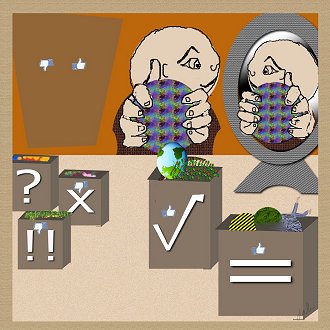A Secular Understanding of Dependent Origination: #7 Feeling
 |
|
Still in the field of sense information, here we are being asked to look at what feelings arise in response to the contact through the senses. It is at the moment of contact and with the rapid arising of feeling in response to that contact that we have our earliest opportunity to stop the whole process.
In other suttas, feeling is described in a way that is more like our modern definitions: as feelings of pleasure, pain, or neither of those. This gives us information about what sorting we are doing that is more useful to us in seeing what is going on than just “feeling that results from contact with a sense”. Even so, this is still telling us what to look at, but not how it fits into the process that is being described. We look and see pleasure, or pain, or that we don’t care about what our senses just came into contact with — so what?
The answer to that question is provided by observing the larger picture — where have we just come from (the effects of sankhara’s drives) and where does the process lead? Fortunately this middle portion of the chain of events has been well-interpreted over the years as being the way our encounters with the world lead us into having opinions about things — we’ll see why this is clear in the next couple of steps — but it is important to notice that the usual descriptions of each link don’t describe what is happening, but what to look at to see what is happening. This is even true of noticing what our experience of contact is: we sort it, but why do we sort it? What is the basis of our categories? That information has been provided by the earlier sections, so it is not what is discussed in the link itself. The driving force comes from the links before this; they plant the seed in this field. Without that seed, what grows in this field will not be whatever produces dukkha.
Just as with the previous links, when we look at the field — in this case of feelings — there are things that grow in the field that are not going to bring about dukkha, and so are not the problem. Simple hunger and the recognition that we need food is not about an overwrought sense of self — it’s just about needing the requisites, and the Buddha allowed the requisites as necessary: food, water, clothes, shelter, medicines, none of these are a hindrance to breaking free of the cycle. It’s only when we go over the top with them, and incorporate them into our sense of who we are, and find ourselves needing more or better than others have, that we have problems. So feelings not entwined with a sense of self but just with basic human needs aren’t the feelings that end at the point of liberation. By extension, it’s possible to recognize that there are feelings that are not a problem; the Buddha names some of them: compassion, joy in others’ accomplishments, friendliness, equanimity. We can see from this that what’s being said when we discuss breaking the links in DA and ending all of these is not *all* human feeling (just as it’s not all desire for existence, or all awareness, or — looking further along the chain — all aging and all death) but only the parts of these that are involved with the production of dukkha.
